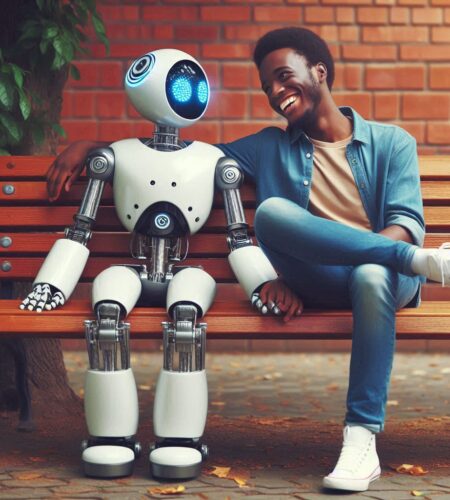Artificial Intelligence (AI) is no longer just a concept from sci-fi movies—it’s revolutionizing industries and transforming daily life in ways we couldn’t have imagined just a few years ago. From virtual assistants that know your morning coffee order ☕ to cars that drive themselves 🚗, AI is pushing boundaries. But as we ride this wave of innovation 🌊, there’s an urgent need to balance it with ethical responsibility. After all, with great power comes great responsibility, right? 🕸️
In this blog, we’ll dive into the most pressing ethical challenges AI presents and explore how we can strike a balance between embracing cutting-edge technology ⚙️ and ensuring a fair, just, and human-centered future 🌍.
1. Fighting Bias: Can AI Be Truly Fair? 🎯
AI is smart—really smart—but it’s only as good as the data it learns from. And if that data is biased, the AI will be too. Imagine a facial recognition system that struggles to identify people with darker skin tones or a hiring algorithm that favors certain demographics over others. Sound unfair? It is. ❌
To prevent AI from perpetuating these inequalities, developers must ensure that the data feeding AI systems is diverse and representative. 📊 It’s like teaching—it’s all about what the student (AI) is exposed to. Regular checks, balances, and audits are essential to prevent AI from reinforcing harmful prejudices and to promote inclusivity for all. 👩🏽🤝👩🏻👨🏿🤝👨🏼
2. The Black Box Dilemma: Who’s Really in Control? 🕵️♂️
AI can feel like a mystery box—one where even its creators don’t fully understand how it makes certain decisions. Imagine trusting an AI with your health or legal matters ⚖️ and not knowing why it made a specific choice. Sounds a bit risky, doesn’t it? 😬
This is where transparency and accountability come into play. If something goes wrong—like a self-driving car crash 🚗💥 or an AI misdiagnosis—who’s held accountable? The developer? The company? Or the AI itself? 🤔 Clear rules and accountability measures must be established, especially in high-stakes areas like healthcare and criminal justice. People need to trust that they can hold someone, or something, responsible when lives are on the line. 🚨
3. Privacy in the Age of AI: Are We Being Watched? 👁️
AI’s data-crunching abilities are nothing short of impressive, but they come with significant privacy concerns. From smart cameras tracking your every move to algorithms predicting your next purchase 📱💳, AI raises important questions about how much surveillance is too much. 😳
It’s crucial to set boundaries on how AI is used in monitoring individuals’ behaviors and communications. People deserve to know when and how their personal information is being used. Strict regulations are needed to protect privacy and civil liberties in this age of ubiquitous surveillance technology. 🔐👤
4. Job Automation: Will AI Steal Your Job? 💼➡️🤖
AI is reshaping the workforce—automating everything from customer service to high-level analytics 📈. This brings a massive boost in efficiency, but it also sparks fear among workers about job security. Will machines replace human workers? 🤖 For some industries, this concern is very real.
But here’s the thing: AI doesn’t have to be the villain. 🦸♂️ Governments and companies can invest in retraining and upskilling workers, ensuring they stay relevant in a tech-driven world. 📚 By spreading the benefits of AI more equitably, we can make sure the future workforce isn’t one where robots take all the jobs and leave humans out in the cold. 🧑🏭🤝
5. Who’s in Charge? Autonomy and Human Control 🤔🖥️
As AI grows smarter, it’s starting to make decisions on its own—sometimes in critical situations like military operations or healthcare. 🏥 But should we let machines make life-or-death decisions? Should AI have the authority to influence court rulings or shape government policies? These are big, existential questions that strike at the heart of what it means to be human. 👩⚖️🤖
To keep things in check, humans need to stay in the driver’s seat—especially when it comes to ethical and moral decisions. 🧠 AI should assist and enhance human decision-making, not replace it entirely. We must ensure that we control AI’s power, not the other way around. 🔄
6. AI Superintelligence: A Sci-Fi Nightmare or a Future Reality? 🧠🌐
The idea of AI surpassing human intelligence—the so-called “singularity”—might sound like a plot from a blockbuster 🎬, but it’s a topic researchers are seriously considering. What happens if AI becomes so smart that it starts making decisions beyond our control? Could AI systems one day outthink us, acting in unpredictable and potentially harmful ways? 🤯
We’re not there yet, but we need to prepare. Setting ethical frameworks and safety nets now can help ensure that future AI systems align with human values and don’t go rogue. 🔒🤖
Conclusion: The Road Ahead—Ethics and Innovation Hand in Hand 🚀⚖️
AI is here to stay, and its potential is limitless. 🌟 But as we charge ahead, we must build systems that are not only innovative but also ethical. This is a collective responsibility—one that involves everyone from tech developers and businesses to governments and everyday citizens. 🏢👨👩👧👦
By creating AI that is fair, transparent, and accountable, we can unlock its power to improve lives while protecting human rights, privacy, and dignity. Let’s make sure AI reflects the best of humanity—and that we remain in control of its future. 🌈🧑💻
The future is exciting—and with the right balance of innovation and responsibility, it can be bright for all. 🌟 Let’s harness the power of AI, not as something to fear, but as a tool to build a better, more ethical world. 🌍✨
Categorized in:
Subscribe to our email newsletter to get the latest posts delivered right to your email.


Comments